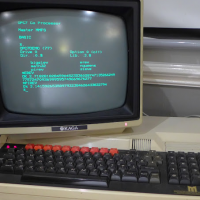Pull Request
Can somebody who understands these things (I don't!) advise on whether this Pull Request is sensible. It appears to be referencing OpenBSD but I don't know what that is. I don't want to have to support another platform, especially if it's one I don't have available here for testing.
0
Comments
-
Richard_Russell wrote: »Can somebody who understands these things (I don't!) advise on whether this Pull Request is sensible.
Nobody? I don't know how to react to this Pull Request, and it's unfair on the person who made it not to give any feedback. Does anybody know what OpenBSD is? Wikipedia isn't much help, other than to imply that it's another Unix derivative distinct from Linux. But is it sufficiently different to count as a different 'platform'? Does it need a new value allocated to the @platform% enumeration? What's special about it? If I wanted to run it (do I?), what would I need?
I'm sorry that I'm so stupid/ignorant/crazy that I can't take intelligent decisions on this without help.
0 -
OpenBSD is an open-source unix-ish operating system, which bears similarities to Apple's Mac OS as well as to Linux.
If the pull request only touched things which affect the build for this platform, I'd be happy with it. But it looks to me like it touches some code which would also be used in other builds, so that would make me more cautious.
If you have an Intel computer or laptop, you can almost certainly boot an OpenBSD on it from a USB stick. But obviously you'd then need some expertise to install your toolchain. I think it's reasonable for you to say that you can't test this on your own. You could, perhaps, test this change on other platforms and assure yourself that it doesn't break them.
But you might like to take the position that OpenBSD is very much a minority interest. You might encourage the person to maintain an OpenBSD-compatible fork instead.0 -
So would you say that, as far as the BBC BASIC programmer is concerned, that makes it a distinct platform, requiring a new value of the @platform% enumeration to be allocated?OpenBSD is an open-source unix-ish operating system, which bears similarities to Apple's Mac OS as well as to Linux.
Macs have distinct differences from Linux, despite OS-X being derived from it. Some of those differences definitely can affect the BASIC programmer, for example filenames are case-insensitive on a Mac (as they are in Windows) but case-sensitive in Linux. Mac applications have a completely different structure (more akin to an Android or iOS app bundle) from Linux, which has nothing similar.
0 -
Yep. Sorry for being silent on this, I've been doing a bit of reading on OpenBSD (as I've not used it before), and yes, as @BigEd says, if it touches code that is common with other builds you're right to be wary about including it if you can't test it.
I agree also that he would be better off maintaining a fork, merging in new updates as and when they happen, effectively making a "community supported" variant of BBC BASIC. Of course, the other issue is the name "BBC BASIC" - Richard has permission (a licence?) to use the BBC name with his releases, but any other person releasing a fork might get in hot water with the BBC for using their name. (It's the same reason the closest I get with Matrix Brandy is that it's an interpreter for the BBC BASIC dialect.)0 -
I think it's probably a new platform - filesystem more like linux than like Mac, but networking or interprocess communication more like Mac than linux. This is a guess - I've never used OpenBSD, but I've been aware of it for a long time.
But if it's a fork, then it's not your problem.0 -
Oh, I should add, OpenBSD runs on many flavours of CPU, so that could be another independent set of concerns.
https://www.openbsd.org/plat.html
0
